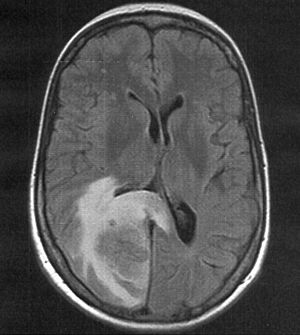Cerebral oedema facts for kids
Cerebral œdema (or cerebral edema) is a build-up of extra fluid in the brain. It causes swelling. It is caused by physical trauma or an injury to the brain. This includes inflammation of the brain caused by some infections. Also, mountain climbers at high altitude have been known to experience cerebral oedema primarily due to reduced air pressure acting on the cranium.
Cerebral edema is commonly seen in a variety of brain injuries including ischemic stroke, subarachnoid hemorrhage, traumatic brain injury, subdural, epidural, or intracerebral hematoma, hydrocephalus, brain cancer, brain infections, low blood sodium levels, high altitude, and acute liver failure. Diagnosis is based on symptoms and physical examination findings and confirmed by serial neuroimaging (computed tomography scans and magnetic resonance imaging).
The treatment of cerebral edema depends on the cause and includes monitoring of the person's airway and intracranial pressure, proper positioning, controlled hyperventilation, medications, fluid management, steroids. Extensive cerebral edema can also be treated surgically with a decompressive craniectomy. Cerebral edema is a major cause of brain damage and contributes significantly to the mortality of ischemic strokes and traumatic brain injuries.
As cerebral edema is present with many common cerebral pathologies, the epidemiology of the disease is not easily defined. The incidence of this disorder should be considered in terms of its potential causes and is present in most cases of traumatic brain injury, central nervous system tumors, brain ischemia, and intracerebral hemorrhage. For example, malignant brain edema was present in roughly 31% of people with ischemic strokes within 30 days after onset.
Contents
Signs and symptoms
The extent and severity of the symptoms of cerebral edema depend on the exact etiology but are generally related to an acute increase of the pressure within the skull. As the skull is a fixed and inelastic space, the accumulation of cerebral edema can displace and compress vital brain tissue, cerebral spinal fluid, and blood vessels, according to the Monro-Kellie doctrine.
Increased intracranial pressure (ICP) is a life-threatening surgical emergency marked by symptoms of headache, nausea, vomiting, decreased consciousness. Symptoms are frequently accompanied by visual disturbances such as gaze paresis, reduced vision, and dizziness. Increased pressures within the skull can cause a compensatory elevation of blood pressure to maintain cerebral blood flow, which, when associated with irregular breathing and a decreased heart rate, is called the Cushing reflex. The Cushing reflex often indicates compression of the brain on brain tissue and blood vessels, leading to decreased blood flow to the brain and eventually death.
Causes
Cerebral edema is frequently encountered in acute brain injuries from a variety of origins, including but not limited to:
- Traumatic brain injury
- Stroke
- Tumors
- Infections (such as a brain abscess or meningitis)
- Hepatic encephalopathy
- Posterior reversible encephalopathy syndrome
- Radiation-induced brain edema
- Post-surgical changes
- Amyloid-related imaging abnormalities associated with edema (ARIA-E)
- Hyponatremia
- High-altitude cerebral edema
Risk factors
Cerebral edema is present with many common cerebral pathologies and risk factors for development of cerebral edema will depend on the cause. The following were reliable predictors for development of early cerebral edema in ischemic strokes.
- Younger age
- Higher severity of symptoms on the National Institutes of Health Stroke Scale
- Signs of current ischemia on clinical exam
- Decreased level of consciousness
- Hyper dense artery sign and larger affected area on CT imaging
- Higher blood glucose
Outcomes
Cerebral edema is a severe complication of acute brain injuries, most notably ischemic stroke and traumatic brain injuries, and a significant cause of morbidity and mortality.
- Cerebral edema is the cause of death in 5% of all patients with cerebral infarction and mortality after large ischemic strokes with cerebral edema is roughly 20 to 30% despite medical and surgical interventions. Cerebral edema usually occurs between the second and fifth day after onset of symptoms. Large territory ischemic strokes can lead to the rapid development of malignant brain edema and increased intracranial pressure. Cerebral edema in the context of a malignant middle cerebral artery (MCA) infarct has a mortality of 50 to 80% if treated conservatively. Individuals with cerebral edema had a worse 3-month functional outcome than those without edema. These effects were more pronounced with increasing extent of cerebral edema and were independent of the size of the infarct.
- Mild traumatic brain injury (TBI) represents 70-90% of all reported head injuries. The presence of brain edema on the initial CT scan of those with traumatic brain injuries is an independent prognostic indicator of in-hospital death. The association of brain edema with increased in hospital risk of death was observed in TBI across all level of severity. Edema in the acute and chronic phases were associated with a worse neurologic and clinical outcome. Children with TBI and cerebral edema have worse clinical outcomes as well.
See also
 In Spanish: Edema cerebral para niños
In Spanish: Edema cerebral para niños


